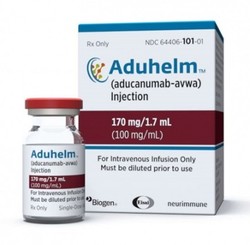Biogen’s first anti-amyloid antibody, Alzheimer’s disease treatment Aduhelm (ingredient: aducanumab), is suffering a series of setbacks.
According to the annual securities filing by Biogen on Thursday, the U.S. Federal Trade Commission (FTC) and the Securities and Exchange Commission (SEC) started separate investigations into Aduhelm.
The FTC is an anti-trust agency protecting consumers and promoting industry competition, and the SEC is a government agency overseeing the U.S. stock market and protecting investors.

Biogen said it recently received a civil investigative demand from the FTC, similar to an administrative subpoena.
The SEC also asked Biogen about Aduhelm’s marketing and approval, including healthcare sites, the company said.
This means that the U.S. authorities raised questions about Aduhelm’s benefit and reliability even in the U.S., the only market where the company released Aduhelm successfully,
Aduhelm is an anti-amyloid beta antibody treatment jointly developed by Biogen and Eisai.
It is the first-in-class drug approved for the treatment of Alzheimer's disease.
Although the medication obtained FDA’s accelerated approval in June 2021, it is still being reviewed in Europe and other regions.
The FDA’s nod for Aduhelm sparked a controversy.
Critics have pointed out that efficacy data from phase 3 trials, submitted for marketing approval, was not consistent. They also said that approval was not based on the drug’s direct therapeutic effect but on reducing amyloid-beta plaques, a surrogate biomarker.
All FDA’s advisory committee members agreed that the FDA should not authorize Aduhelm because the drug offered unclear benefits compared to risks.
However, the FDA ignored the panel’s opinion and went ahead to grant the permit, intensifying the controversy.
Aduhelm received approval on the condition that it should prove efficacy through a confirmatory clinical trial later. If the condition is not met, the FDA could revoke the license.
Such uncertainty about Aduhelm led to sluggish sales. Biogen said Aduhelm sold only about $3 million in 2021.
The poor performance of Aduhelm was partly attributed to its high price tag.
Biogen set the initial annual price of Aduhelm at $56,400, which stirred up the cost-effectiveness controversy in the U.S. market.
The Institute for Clinical Economic Review (ICER), a non-profit group, released an opinion saying their panelists voted unanimously that Aduhelm was not cost-effective and forecast that the highly-priced Aduhelm would strain Medicare budgets.
In response, Biogen boldly cut the price of Aduhelm by half to $28,200, effective from January this year.
This was because Medicare and Medicaid Service Center (CMC), the representative health insurance system for the elderly in the U.S., started making the criteria for insurance coverage of anti-amyloid beta antibodies, including Aduhelm.
However, CMC released the draft criteria for insurance coverage in January despite the price reduction by half, stating that the treatment cost would be covered only for patients enrolled in anti-amyloid beta antibody clinical trials.
The CMC is likely to complete the anti-amyloid beta antibody reimbursement criteria in the second quarter of this year.
Not only Biogen but Lilly and Roche that are developing late-comer Alzheimer’s drugs, are paying keen attention to the criteria for insurance coverage.
In December, the EMA’s Committee for Medicinal Products for Human Use (CHMP) refused to grant marketing approval for Aduhelm.
Biogen said it would re-apply for Europe’s review for Aduhelm.

